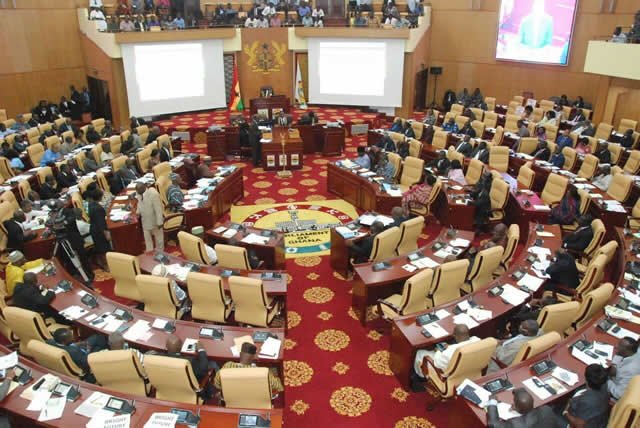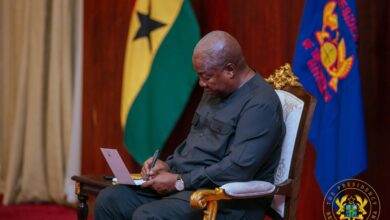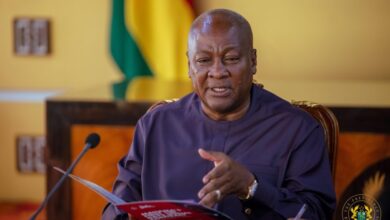
The political disagreement on issues emerging from the nineth parliament, barely two weeks after the swearing-in of President John Dramani Mahama, is generating a lot of political noise and narrow-minded approaches from both sides. It is crucial for both parties to prioritize Ghanaian interests in all their deliberations.
The signal Ghanaians sent to the political class in the 2024 elections was clear: it is not about the NPP or NDC, but about putting Ghana first. The citizenry has the power to dictate the country’s agenda. Politically, both sides of the house in parliament must remember that Ghanaians are watching carefully. In their quiet, sober reflection, they must recognize that another change could shock politicians who still think they know more than Ghanaians.
Going forward, the role of Afenyo Markin as the Minority Leader is to be the floor leader of the minority party in the Ghanaian Parliament. He is responsible for leading his party’s legislative strategy and efforts in the respective chamber. The Minority Leader is elected by their party’s members and serves as the face and spokesperson of the minority party. They coordinate the legislative strategy and tactics of their party, including scheduling floor debates, managing amendments, and organizing opposition to the majority party’s initiatives. The Minority Leader works closely with their party’s Whips to ensure party unity and discipline on key votes. They play a crucial role in the legislative process, using procedural tactics to slow down or block the majority party’s agenda. The Minority Leader’s position is particularly important during times of divided government when the president and parliament are controlled by different parties.
In another development, the Minority Leader is responsible for leading their party’s legislative strategy and efforts in the respective chamber. This includes coordinating the party’s response to the majority party’s initiatives, scheduling floor debates, managing amendments, and organizing opposition to the majority party’s agenda. The Minority Leader works closely with their party’s Whips to ensure party unity and discipline on key votes. However, the tactics of the minority leader can sometimes be seen as destructive and unnecessary, lacking political maturity. They carry the baggage of a huge defeat, and the party’s image and brand must support the base and cohesion of the party, which is still healing from the wounds of defeat.
The relationship between the Minority Leader and the Majority Leader is complex and often adversarial. While they both serve as the floor leaders of their respective parties, their primary goals are often at odds. The Majority Leader is responsible for setting the legislative agenda and coordinating their party’s activities, while the Minority Leader leads the opposition and uses procedural tactics to slow down or block the majority party’s initiatives.
The importance of the Minority Leader’s role in the context of checks and balances cannot be overstated. As the leader of the opposition party in parliament, the Minority Leader serves as a counterweight to the power of the majority party and the president. They can challenge the majority’s agenda, propose alternative policies, and ensure that the minority party’s voice is heard in the legislative process. This checks the power of the majority and helps maintain a balance of power between the branches of government. The Minority Leader’s ability to slow down or block the majority’s initiatives can also force compromise and bipartisanship, which is essential for the effective functioning of the country’s political system. Ultimately, the Minority Leader’s role is a critical component of the system of checks and balances that underpins Ghana’s democracy.
Reflecting on the recent election defeat of the New Patriotic Party (NPP) in 2024, several internal and external factors shaped the political landscape and voter sentiment. These factors include governance challenges, economic conditions, opposition strategies, and the overall public perception of the party’s performance. Afenyo Markin must consider the task ahead of him, as the journey to another election is long and difficult. The minority leader needs to adopt an inclusive agenda to bring back breakaway supporters to the party and avoid the strategies that led to their recent defeat in the presidential and parliamentary elections.
A significant reason for the NPP’s defeat lies in the economic difficulties faced by the country during their tenure. High inflation, a depreciating currency, and increasing unemployment rates created widespread discontent among citizens. Many voters attributed these economic struggles to mismanagement by the NPP government, which failed to implement effective policies. The rising cost of living, combined with stagnant wages, further alienated the middle and lower-income demographics, eroding the party’s support base. Corruption allegations also played a pivotal role in diminishing public trust in the NPP. Several high-profile scandals involving government officials tarnished the party’s image, leading to perceptions of systemic corruption. Efforts to address these allegations were seen as insufficient, amplifying public dissatisfaction. The opposition capitalized on these scandals, portraying the NPP as a party disconnected from the needs of ordinary citizens and focused on self-enrichment.
Internally, the NPP struggled with factionalism and a lack of unity. Leadership disputes and infighting within the party weakened its ability to present a cohesive front to the electorate. Disagreements over policy direction and candidate selection created rifts that undermined the party’s credibility. These divisions also hampered the NPP’s campaign efforts, as resources and energy were diverted to resolving internal conflicts rather than engaging voters effectively.
Additionally, voter fatigue played a role in the NPP’s defeat. Having been in power for consecutive terms, the party faced the challenge of maintaining its appeal in the face of growing demands for change. Many voters perceived the need for new leadership to address longstanding issues, and this sentiment was amplified by the opposition’s promise of reform and renewal.
The neglect of the NPP stronghold in the Asante region and the lack of infrastructure development were significant factors contributing to the NPP’s recent election defeat. These issues highlight a disconnection between promises made and the realities experienced by the electorate in a region traditionally known for its loyalty to the ruling party. The perceived lack of attention to pressing local needs, coupled with inadequate efforts to address infrastructure deficits, likely eroded trust and support among voters. This disenchantment, combined with broader national concerns, underscores the pivotal role of strategic regional engagement and tangible development in shaping electoral outcomes.
The management of social issues also contributed to the NPP’s loss. Policies perceived as neglectful of marginalized groups or regions created a sense of exclusion among certain communities. This dissatisfaction translated into reduced voter turnout in traditional NPP strongholds and increased support for the opposition in previously contested areas.
The defeat of the NPP in the recent elections can largely be attributed to other significant factors: the failure to address illegal mining (galamsey), the President’s refusal to reshuffle ministers, and the perceived arrogance of power by government officials. These issues collectively eroded public trust and painted a picture of an administration out of touch with the concerns of ordinary Ghanaians. President Akufo-Addo’s decision not to reshuffle his ministers throughout his administration drew widespread criticism. Many Ghanaians viewed this as a refusal to hold underperforming officials accountable or to bring fresh energy into key sectors. This inaction was perceived as a sign of complacency and an unwillingness to respond to the evolving challenges facing the country. As public dissatisfaction grew, the administration’s rigidity in this regard became a liability. Lastly, the arrogance of power displayed by certain members of the government further alienated the electorate. Statements and actions perceived as dismissive or out of touch only deepened the divide between the leadership and the people. The combination of these factors created a groundswell of discontent, culminating in the NPP’s electoral defeat. Moving forward, the party must learn from these mistakes, prioritize accountability, and work to reconnect with the needs and aspirations of the Ghanaian people.
In conclusion, the minority role in the ninth parliament is very tactical and challenging. As the NDC rides the wave of support with the majority cards and good leadership from the president, the minority leader needs to think through all his actions and directions. Otherwise, the numbers will dwindle again in the next election.
Story by: Alexander Kukah



